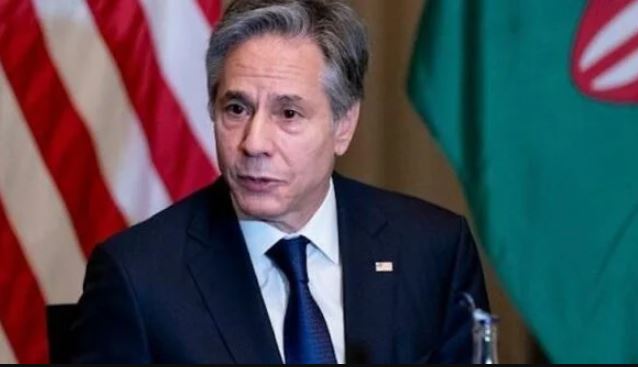#EndSARS: US May Stop Military Aid To Nigeria Over Rights Abuse, Blinken Warns
Posted by Samuel on Sun 21st Nov, 2021 - tori.ng
US Secretary of State, Antony Blinken
The United States of America has once again warned that it may stop rendering military assistance to Nigeria if the country fails to protect human rights, The PUNCH reports.
The US Secretary of States, Antony Blinken, who gave the warning, also urged the federal and Lagos State governments to sanction any individuals found to have violated human rights during the October 2020 #EndSARS protests when the white paper on the Lagos State Judicial Panel of Inquiry on Restitution for Victims of SARS Related Abuses and Other Matters is ready.
He warned that if the rights violations persisted, the US government might evoke the Leahy Law to deny Nigeria access to hardware, which includes arms and other military equipment to fight terrorism and other forms of criminalities.
An eight-man panel led by retired Justice Doris Okuwobi had submitted a 309-page report to the Lagos State Governor, Babajide Sanwo-Olu, on Monday, indicting soldiers and police for killing peaceful protesters at Lekki toll gate on October 20, 2020.
Describing the Lekki toll gate incident as a massacre, the panel report stated that at least nine persons were killed by security agents at the scene and listed 48 names as casualties, including 22 protesters, who sustained gunshot injuries and 15 others allegedly assaulted by soldiers and police.
During a meeting with the President, Major General Muhammadu Buhari (retd.), on Thursday in Aso Rock, Abuja, Blinken had said America anticipated the response of the federal and Lagos State governments to the panel’s findings.
On Friday, Blinken met with members of the civil society in Abuja, reiterating the US’ demand for justice.
In an interview with CNN, the transcript of which was made available to Sunday PUNCH by the US Department of State, Blinken urged Nigeria to bring those indicted by the panel report to book.
He said the US might evoke the Leahy Law on military aid against Nigeria if the country failed to protect human rights.
The Leahy Law is an American rights ordinance that prohibits the US government from providing military assistance to foreign security force units that violate human rights with impunity.
Asked during the CNN interview whether the US had changed its conclusion in the light of the panel’s report, Blinken said he was waiting for the full report to be released by the Lagos State Government.
He, however, argued that the most important thing was ensuring that those found wanting face the full weight of the law.
He said, “But a couple of things are really important. As I said, the report itself, done by the state government, but then once it’s out, for there to actually be action on the basis of the report, action as necessary by the states, action by the Federal Government, and action in the sense of two things.
“First, making sure that based on what is documented to have happened, it won’t happen again – so there may be reforms that are necessary – and building or rebuilding trust between the citizens and the security services, between citizens and the state. That is an obligation of both the state government and the Federal Government.
“Second is accountability. If there are individuals that – as it emerges from this report – who are responsible for committing abuses, there has to be accountability in terms of those individuals. That too is vital to rebuilding trust between citizens and the state and the security services.”
On what the US would do if human rights abuses continued, he responded, “And, of course, we also have laws in place – the Leahy laws, for example – that make sure that if there are units that have committed abuses, we’re not going to provide equipment to those units.”
When asked pointedly if the Leahy law would be imposed on Nigeria, the Secretary of State responded, “Well, we look in any instance if – and if there are credible allegations that prove, that we believe meet the standard of the law, yes, of course, we’ll apply the law.”
A petition by rights groups including Amnesty International had recently forced the US Congress to call for the stoppage of weapons sales to Nigeria.
When asked by CNN if the US government would bow to pressure by the US Congress to impose an arms embargo on Nigeria amid incessant allegations of human rights abuse, Blinken said it would all depend on Nigeria’s response.
Blinken stated, “If there is genuine transparency, accountability and change that follows from these incidents and from these abuses, I think that’s very important not only to our administration, it’s important to Congress in making judgments about continuing to provide assistance to the security forces.”
He explained that the assistance being given to the Nigerian military was not only hardware but training to tackle terrorism and criminal activities.
Blinken said, “But the assistance itself is not just the hardware that we might provide – airplanes or helicopters – it’s the software, the human software. Because one of the things that we’re doing is making sure that as we’re providing equipment to deal with profound security challenges that are faced here in Nigeria – terrorism, criminal activity, other violence – that those who will be using the equipment are trained in a way that makes sure that they are doing it to avoid hurting the good guys even as they’re going after the bad guys, to make sure that the laws of armed conflict are fully in mind. And that if they make mistakes, they’re corrected and they’re brought to light immediately. All of that’s very important. And, of course, we also have laws in place – the Leahy laws, for example – that make sure that if there are units that are – that have committed abuses, we’re not going to provide equipment to those units.”



















































